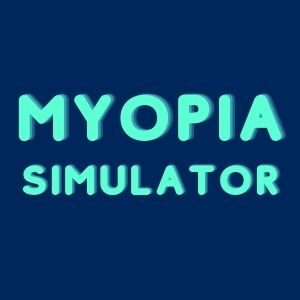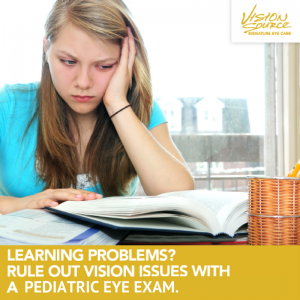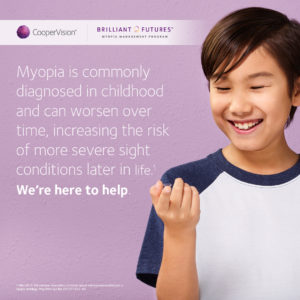LITTLE EYES CENTER
“VISION IS MORE THAN JUST 20/20”
S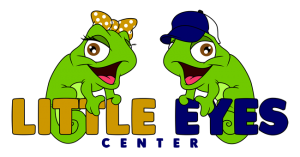 pecializing in:
pecializing in:
- PEDIATRIC EYE CARE
- MYOPIA MANAGEMENT
- NIGHTLENS TREATMENT
- MISIGHT®️ 1 DAY CONTACT LENSES
- PEDIATRIC PHARMACOTHERAPY
Little Eyes Center, a sub-clinic inside River Region Vision Source, specializes in: pediatric eye care, and myopia management. Our doctors feel it is their duty to offer the best in pediatric eye care. Little Eyes Center offers multiple treatment options for myopia management to our patients in the River Region. Myopia Management today could mean less worry tomorrow – If you’ve happily worn glasses or contacts all your life, it might seem excessive to start managing myopia in children as young as eight years of age. However, worsening myopia may contribute to more severe eye health complications and sight-threatening conditions later in life, including: Retinal Detachment, Myopic Maculopathy, Glaucoma and Cataracts. Click the blue myopia simulator button to see what nearsighted vision is like. Don’t take your child’s vision for granted, make an appointment with one of our specialists today!
Myopia Management via NightLens
NightLens OrthoK is a procedure for correcting myopia (nearsightedness), hyperopia (farsightedness), and astigmatism by gently reshaping the cornea with special vision retainers called NightLenses. Sleeping overnight in your NightLenses will gently reshape your cornea; when you awaken, remove your NightLenses and SEE WITHOUT CONTACTS, GLASSES, OR SURGERY. NightLens can also keep a child’s eyes from getting worse through myopia control! Experience clear vision during the day without contact lenses, eyeglasses or surgery!
Learn more about NightLens HERE.
Myopia Management with MiSight®️ 1-day contact lenses
MiSight® 1 day is a soft contact lens that uses ActivControlTM Technology to slow the elongation of the eyes.1 ActivControlTM Technology can simultaneously correct your child’s vision today, while training their eyes to resist growing longer. Learn more about MiSight® 1 day lenses HERE.
Myopia Management with Pharmacotherapy
Laboratory and clinical studies show that low-dose atropine eye drops can slow myopic progression. Pharmacotherapy with low-dose atropine eye drops can be used as a stand alone myopia management option – it can also be used in conjunction to NightLens and/or MiSight® 1 day lenses. Learn more about Pharmacotherapy HERE.
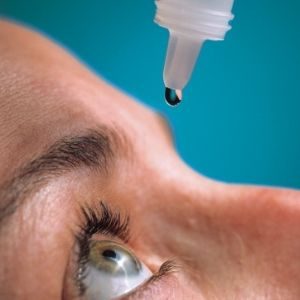
FAQ’s:
Q: Is Little Eyes Center a separate practice from River Region Vision Source?
A: No. Little Eyes is a sub-clinic inside River Region Vision Source. Our doctors have received specialized training to offer pediatric eye care.
Q: My child’s vision keeps getting worse. Is there anything that can be done about it?
A: Yes. We offer multiple treatment options for progressing myopia(nearsightedness) in children. Myopia control means – controlling the progression of nearsightedness as children grow/develop. NightLens OrthoK, MiSight®️ 1 day contact lenses, and pediatric pharmacotherapy are proven methods to keep your child’s eyes from progressing. To learn more about NightLens and Orthokeratology, please visit www.sleepandsee.net Reference(s):
http://medcraveonline.com/AOVS/AOVS-02-00046.pdf
https://coopervision.com/myopia-management
http://reviewofmm.com/category/clinical/pharmaceutical-interventions/
Q: What is amblyopia?
A: Amblyopia or “lazy eye” is a condition in which vision is reduced because the eye and the brain are not working together properly. This may be due to an eye turn, congenital cataract, eyelid drooping, or unequal or very high glasses prescriptions. These conditions create amblyopia because they interfere with the brain’s ability to learn to perceive the world.
Q. What is Convergence Insufficiency?
A. Convergence Insufficiency is the inability to keep the eyes turned in sufficiently to maintain a single image at near, i.e. while reading. It often causes a child to see the words “running together” while reading, which is actually a form of double vision.
Q. What is Accomodative Insufficiency?
A. Accomodative Insufficiency is the inability to focus to keep a clear image at near. It can cause fatigue and headaches with prolonged near work, especially after a full day at school.
Q. How is ADD/ADHD related to vision learning disorders?
A. Kids with ADD/ADHD have a hard time paying attention and focusing on tasks. Sometimes this lack of attention can be from a vision related learning disorder rather than ADD/ADHD. If a child sees double when reading – then they will not pay attention. ADD/ADHD has been studied to correlate with Accomodative Insufficiency and Convergence Insufficiency at a high rate. Reference(s):https://www.ncbi.nlm.nih.gov/pmc/articles/PMC3944293/

